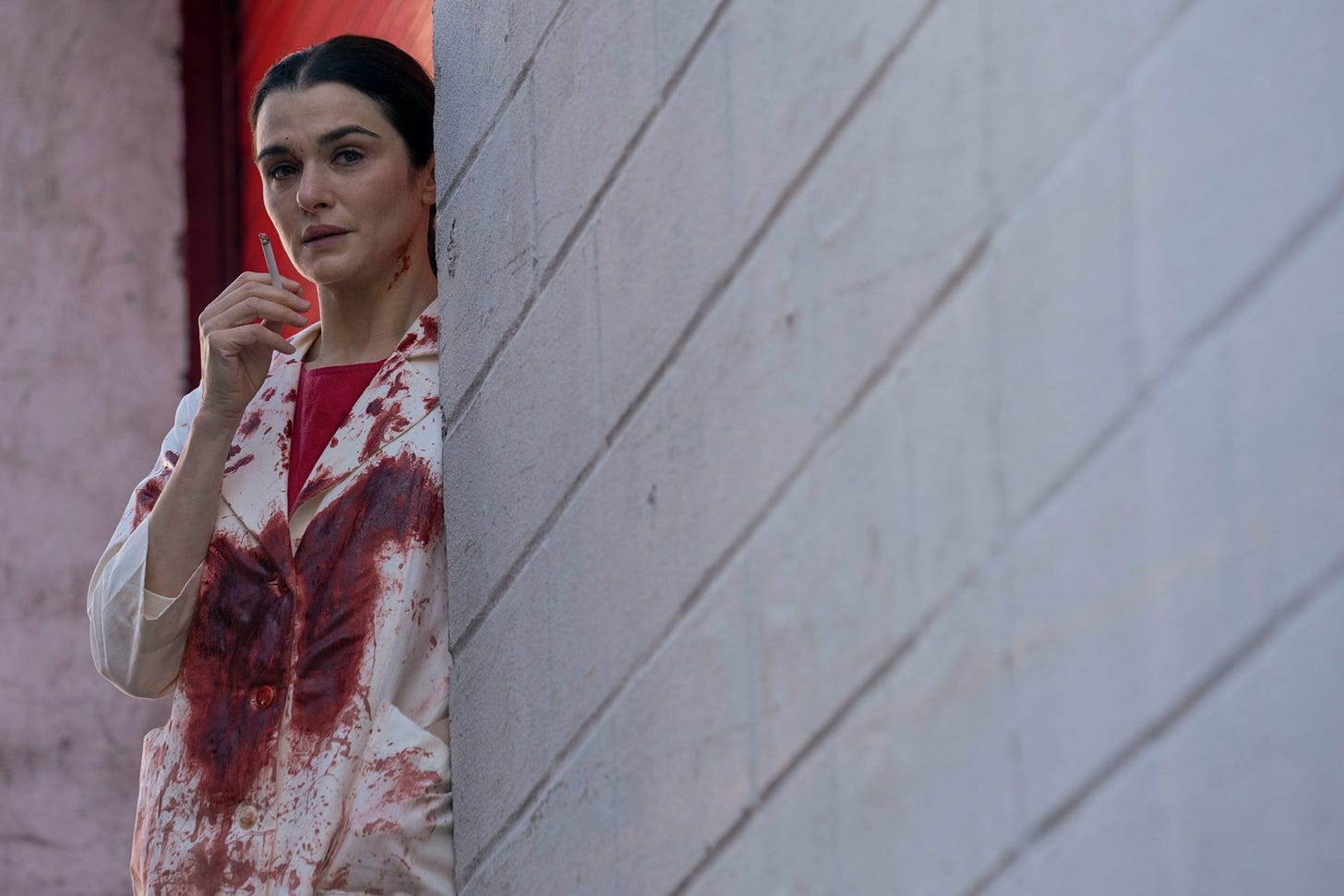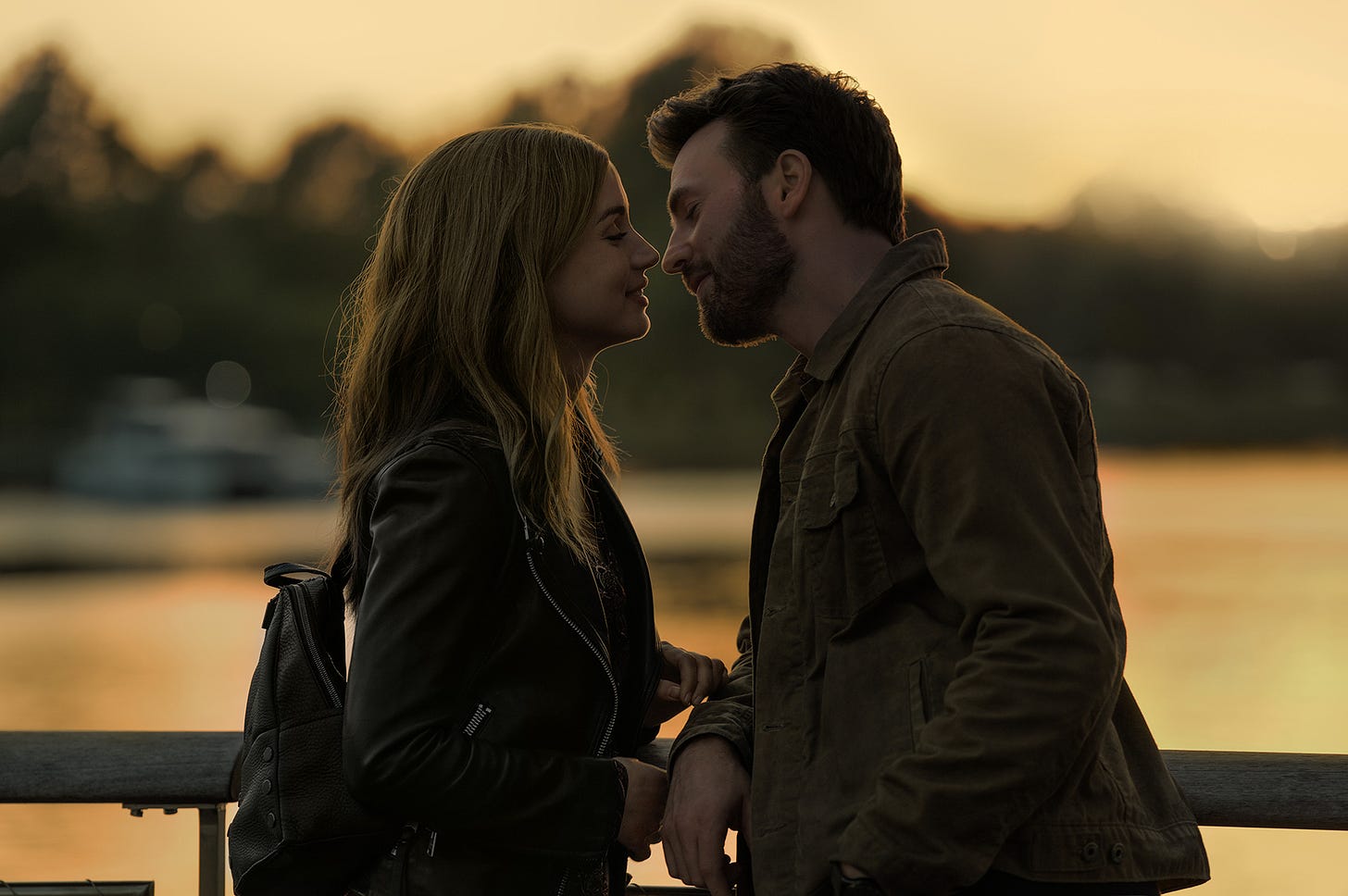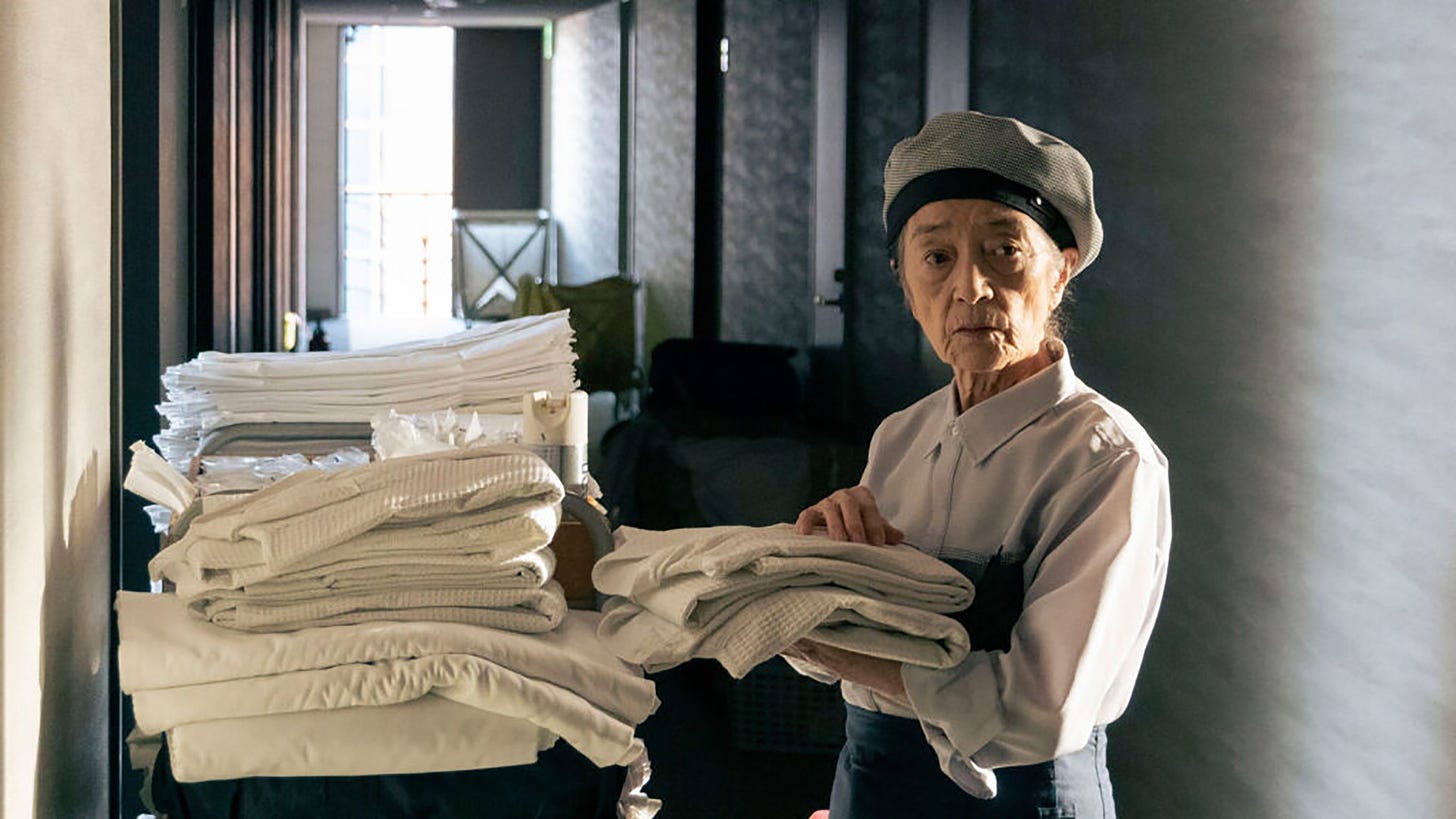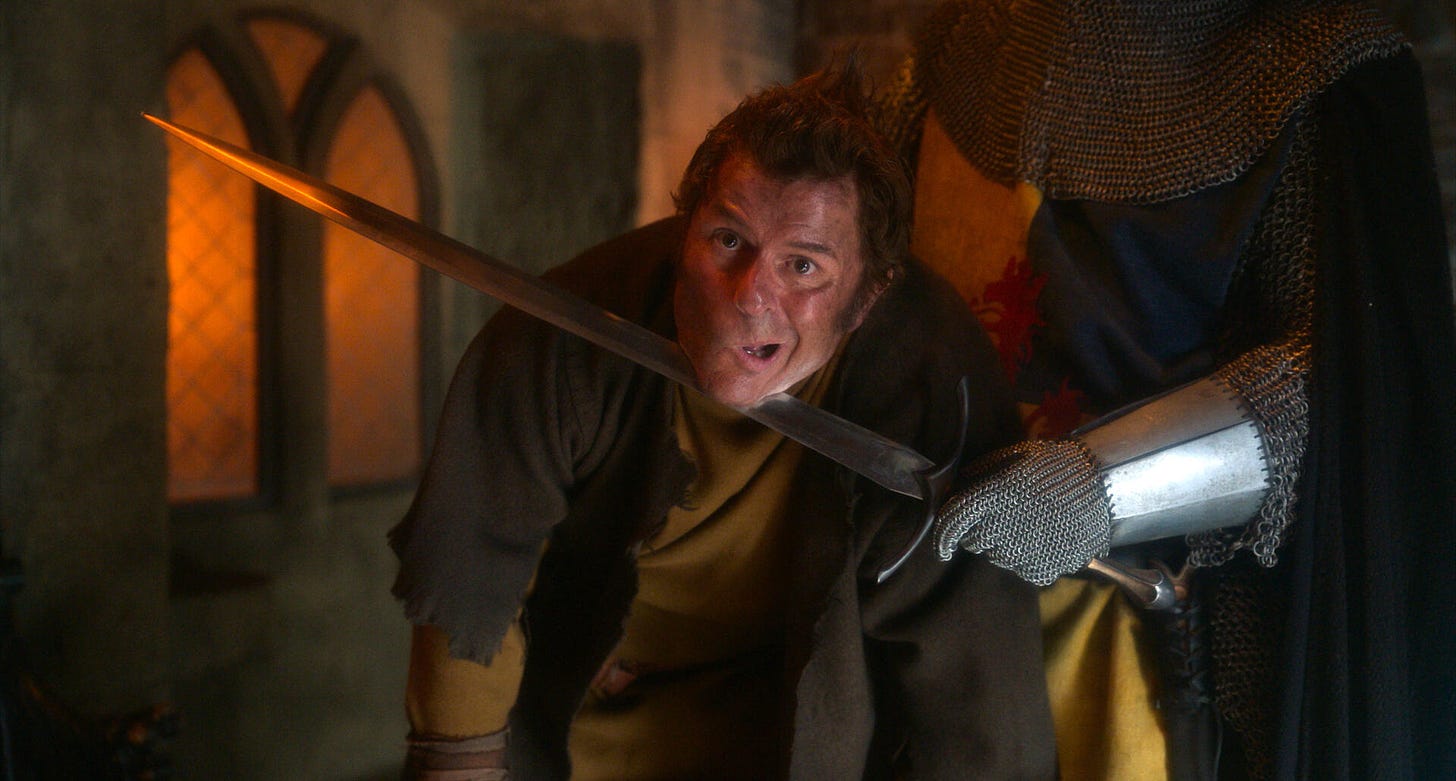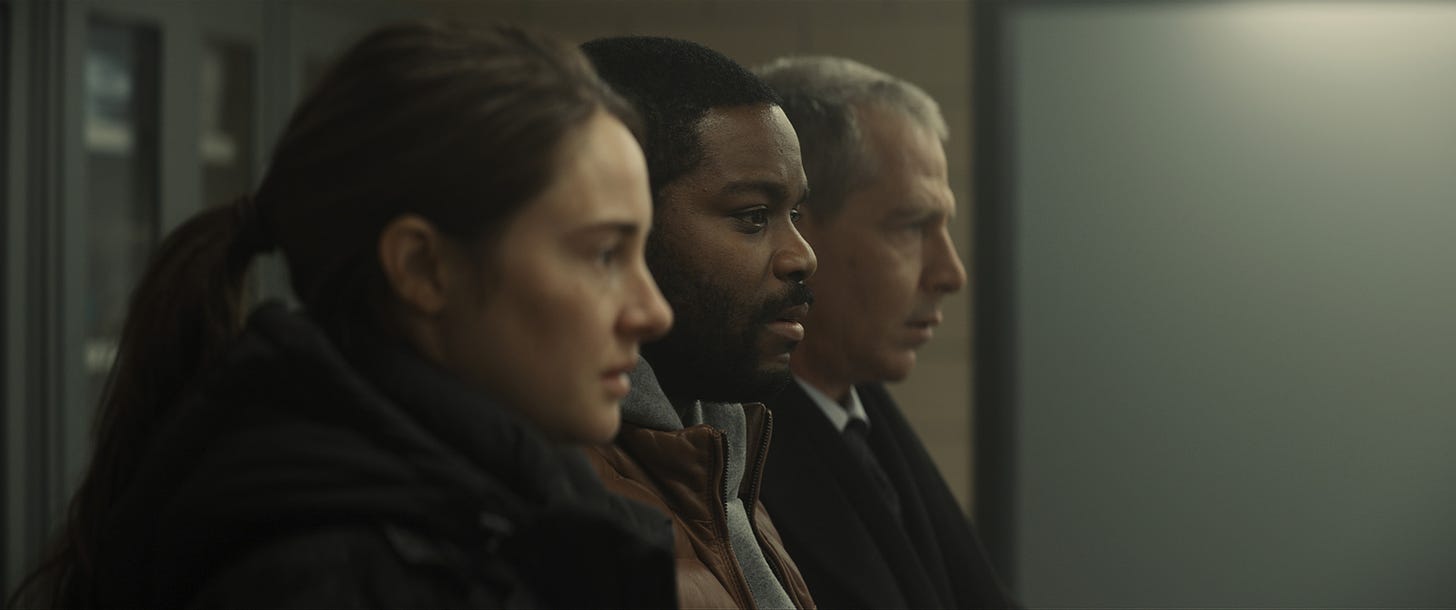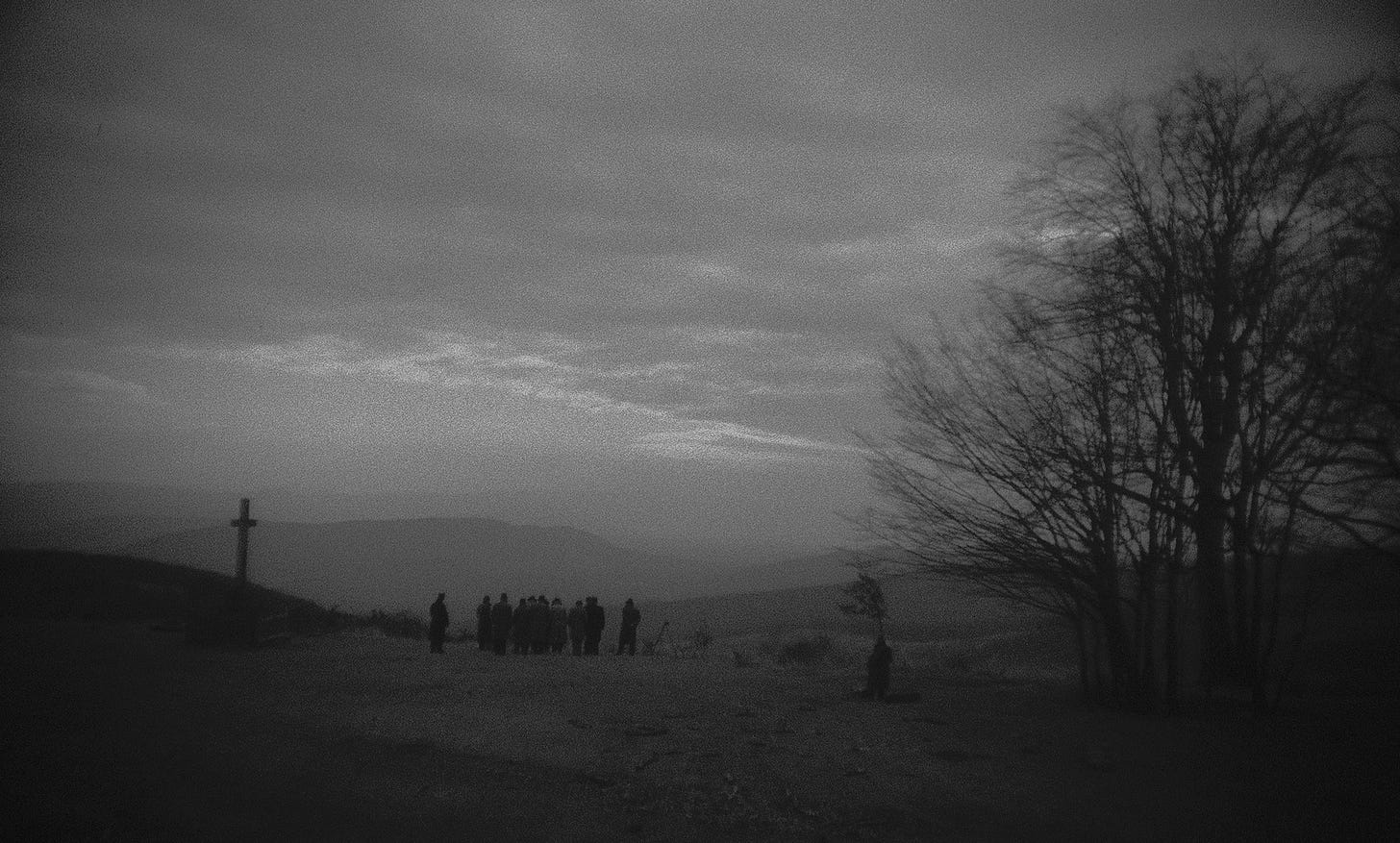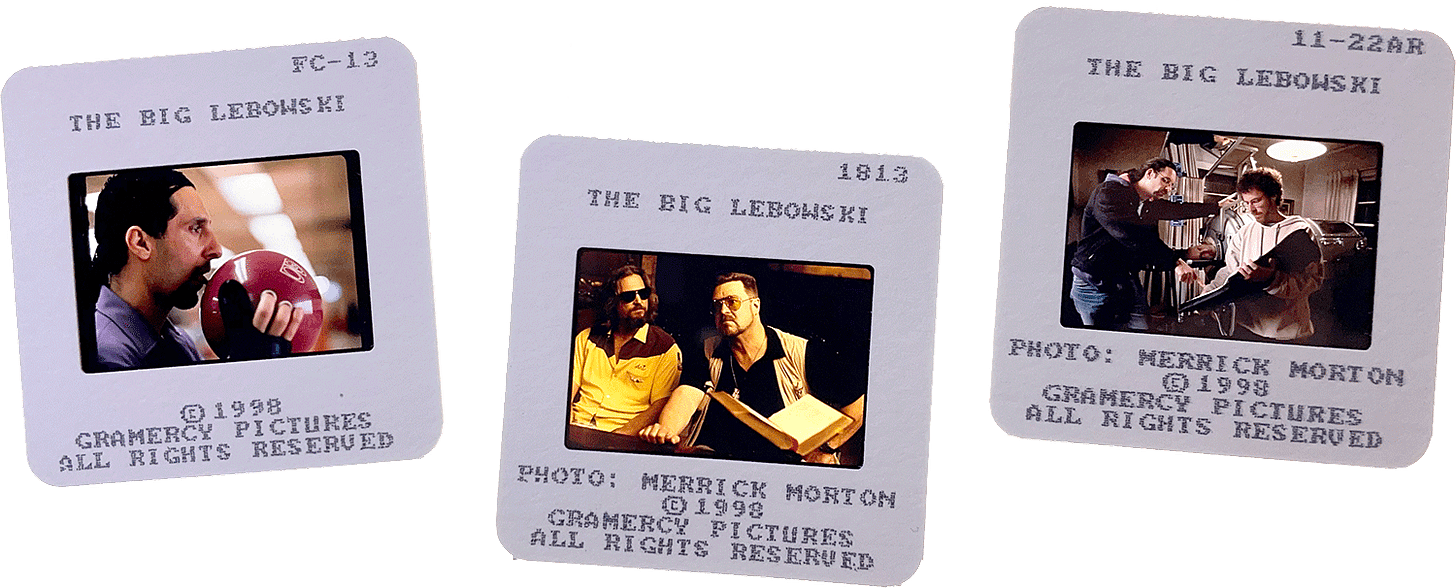It truly is wild how normalized marijuana is today. While people are still in jail for pot offenses—not to mention any doing hard time due to “three strike” offenses for something that is now legal in America (Biden only pardoned those with federal possession charges as far as I’m aware)—Disney’s Searchlight is releasing the new Broken Lizard film on 4/20 and FanFlix sent a new digital film offer with the headline “Get Blazed with an extra 15% off!” Even GHOSTED has a character leaving the frame to casually get high on an edible. The profiteering is so instantaneous that it’s amazing marijuana wasn’t legalized decades ago.
In that vein, my partner and I finished PARTY DOWN Season 3 this week. I wasn’t one of the rabid fans dismayed by its cancellation years ago because I never actually watched it until the pandemic. So, I don’t really have many thoughts beyond simply saying that the return was a ton of fun. Seeing the gang back together with the same impeccable comedic timing would have been enough, but they went all-out to make this six-episode run as successfully irreverent as before. There’s absolutely no drop-off. Laugh-out-loud moments abound, Ken Marino continues his sad-sack brilliance, and Adam Scott’s apathy never ceases to amaze. Here’s hoping a fourth go comes to fruition. Heck, wait another ten years if you must.
What I Watched:
DEAD RINGERS
(now streaming on Prime Video)
The first thought I had upon discovering David Cronenberg’s DEAD RINGERS was getting the remake treat was, “Why?” We’re talking about a masterpiece of cinema by the master of body horror with an iconic dual performance from Jeremy Irons. What could possibly be improved?
The answer, of course, is a lot. Because “improve” isn’t necessarily the correct word to use in conjunction with Alice Birch’s vision for DEAD RINGERS or remakes in general. Since the original isn’t being erased, you’re able to use its existence and ignite a conversation between the two. This is especially true here because of the subject matter: gynecology. Whereas Cronenberg’s film—inspired by Stewart and Cyril Marcus, as fictionalized by Bari Wood and Jack Geasland in their book TWINS—kept the patriarchal history of the profession intact by having its leads be men and therefore having their relationship with their patients be one where they’re reduced to objects for surgery, treatment, or sex, the act of gender-swapping the Mantles opens endless possibilities.
Elliot and Beverly (Rachel Weisz) as women create inroads to commentary on maternal care and motherhood rather than simply misogyny (which is at the heart of Cronenberg’s film considering the psychotic break that occurs is in large part due to Beverly believing the woman he loves is cheating on him, leading to delusions of mutated women—monsters he as a gynecologist must study as entities removed from humanity due to the paranoia born from his battles with rejection and inferiority that have always lingered with Elliot being the more gregarious, “popular” twin). Beverly wants a baby herself and her fight to open a private birthing center in order to avoid the bureaucratic red tape of over-populated and understaffed hospitals is about ensuring all women can achieve that dream too.
Elliot is once again the more sociable and outspoken twin, but she’s also the one who buries her head in the science and research. It may seem incongruous if you have the original film in mind considering Beverly’s shyness and introversion should gravitate towards lab work, but the change is actually an ingenious one that helps us see the differences between these twins on multiple levels. Beverly is compassionate, empathetic, and moral. Elliot is crude, selfish, and power-hungry. Beverly sees their work as a means of protecting women’s bodies. Elliot sees it as a way to play God and render those bodies obsolete. Delusions of mutants become replaced by the potential of gene therapy. Where Beverly’s brilliance paints inside the lines, Elliot wants to eradicate borders altogether.
It’s thus the perfect dynamic to infuse hot button topics. Jennifer Ehle’s Rebecca Parker is a Sackler family stand-in with despicable friends and greedy motivations who offers the money to make the Mantle sisters’ dreams come true. Michael Chernus’ Tom proves a white male scapegoat to use and abuse as the face of Elliot’s extreme scientific experiments without needing to get her own hands publicly dirty. Throw them together and you must question the morality of taking blood money to save lives. Of pushing the boundaries of embryo viability outside the womb and thus creating fuel for anti-abortion proponents to redefine “life.” Horrid people deliver horrid ideas that Elliot embraces with a devilish delight not simply because she wants the money and freedom, but because she also wants the recognition. And Beverly tries to stomach it. Tries to weigh good against bad. Tries to remain human.
Who then is to blame when everything goes off-the-rails? Has Elliot truly been operating in science’s gray areas for her sister alone or is that the lie she tells herself? Has Beverly truly never asked for her to do so? Which is the manipulator and which the manipulated? Introduce Genevieve (Britne Oldford) as a love interest for Beverly and the question becomes whether Beverly is abandoning Elliot or Elliot jealously sabotaging Beverly’s happiness. Every action holds a similarly warring position. Kindness versus rage. Charity versus profit. Unconditional love versus conditional—if the former even exists at all. Because everything is “us” (the sisters) against “them” (one sister and an interloper). The Mantles are in effect a single cell desperate to both remain whole and separate. Except, of course, that the need for space to breathe isn’t always stronger than the need for each other’s air.
The changes Birch and company have instilled are smart and thought-provoking. The direction by Sean Durkin, Lauren Wolkstein, Karena Evans, and Karyn Kusama (whose 5th episode is by far the most memorably nightmarish) impeccable. We move from watching the sisters breathlessly try and work within a system that handcuffs their genius to experiencing their need to compromise with monsters while risking to become ones themselves. We meet their parents (holding their own complex piece to the Mantles’ psychological puzzle), a stand-in for the barbaric origins of their profession (a wonderful Michael McKean), and the enigmatic Greta (Poppy Liu) as their housekeeper and cook who proves a captivatingly intrusive shadow with a maternal mystery all her own. Everything is exaggerated and yet never feels fantastical. The science fiction is grounded in an authentic ethical minefield; the looming danger lost in the schizophrenic blur between reality and illusion.
And Rachel Weisz carries it all with extraordinary gravitas. Elliot’s compulsions (always eating, always seducing). Beverly’s anxiety (always ready to burst when surrounded by cheats, abusers, and opportunists). As the visual and aural structure of the show devolves (the final episode will have you constantly wondering if your phone is vibrating) with scenes seemingly sequenced out of time and memories forever threatening to consume, Weisz must become more and more unhinged in strikingly disparate ways to ensure we always know who is who (even if the ambiguity wants us to question that certainty). That she and the show constantly complement that drama with a demented hilarity only enhances the experience. There’s no looking away. No lulls in the chaos. Much like the twins, we cannot be apart from them for too long.
- 9/10
GHOSTED
(now streaming on AppleTV+)
It’s funny that people apparently think Dexter Fletcher’s GHOSTED has a supernatural element since it obviously doesn’t. It’s funnier that he and the screenwriters (originated by DEADPOOL scribes Rhett Reese and Paul Wernick before getting rewrites from MCU SPIDER-MAN scribes Chris McKenna and Erik Sommers) were cognizant enough about the thought to ensure one of their characters (Tate Donovan’s aptly named “Dad”) would also be confused enough to warrant an in-film definition of the title once Cole Turner’s (Chris Evans) sister Mattie (Lizze Broadway) jokes that her brother has been “ghosted” by the woman he believes could be “the one” because he’s already texted her (emojis count) eleven times in two days post-first date. Once that’s out of the way, the film can finally be what it is: a familiar buddy rom-com that pairs a Regular Joe (Evans) with a deadly CIA Agent (Ana de Armas’ Sadie Rhodes) on a mission to save the world.
I’m never not surprised by the number of copycats coming out of Hollywood while those hoping to take a risk on something new never get the financing to attempt changing the game. Why gamble millions of dollars on a cool idea when you can breathe easy with a safe genre film that’s beat-for-beat identical to countless others because you know A-listers Evans and de Armas are a big enough draw to break even? It’s a silly for-profit dance that unfortunately puts the filmmakers in the crosshairs since the result can never be as good as its theoretical potential. Everyone involved can get the job done successfully with chemistry, special effects, and comedy, but it will always be another empty calorie popcorn flick. They get paid, we have fun, and a few months later the same concept is recycled into another flashy package that accepts its mediocrity the moment someone yells, “Action.”
What does that mean for the project at-hand? It means that I was entertained for two-hours and forgot all about it the moment the credits ended (save for marking down the timestamp of an effective and funny f-bomb to gif later for my site). Chris Evans plays a good damsel in distress once his grand romantic gesture to stalk Sadie across the Atlantic puts him in restraints opposite a ruthless man ready to torture him with dangerous insects because he thinks Cole is someone else. Ana de Armas is a great cutthroat agent who always puts “mission above man”—sentiments that are comically portrayed by more than one ex who lost a limb(s) for no other reason than proximity to her. Their rapport is fantastic; their frustrations hilarious (even if the running joke about them needing to “get a room” grows stale fast). The plot becomes secondary to their dynamic.
This is both a testament to them as performers and evidence that the plot leaves a lot to be desired. Not only is it familiar, but it’s also riddled with lazy gags such as a long line of famous cameos coming on-board to mock themselves while over-extending an eyeroll of a joke. Half the time the film wants us to really feel the stakes (as if either Cole or Sadie are ever truly in fear of being killed amidst the cartoonish action) while the other half wants to jab us in the ribs with a wink for just how clever it is. So, go in with low expectations. Enjoy the ride for what it is (over-the-top antics rather than hyper-stylized flair despite the final showdown wanting so very much to be a budget JOHN WICK) and let Adrien Brody chew scenery with a French accent as our heroes’ cold-blooded villain. Then go back to your day. Because GHOSTED is truly too innocuous to feign even the mildest of emotions either way.
- 6/10
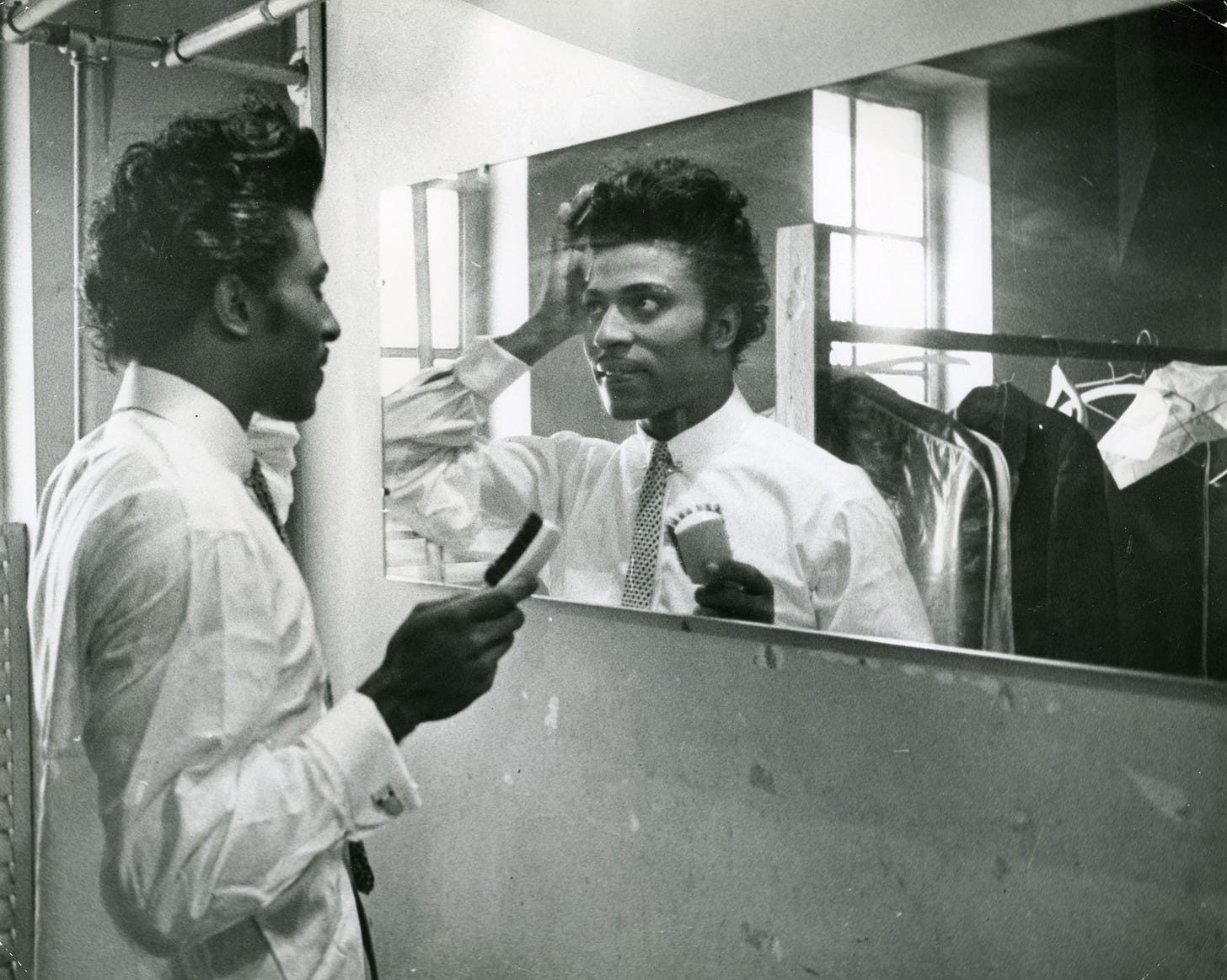
LITTLE RICHARD: I AM EVERYTHING
(now in limited release and on VOD)
The way things go throughout Lisa Cortes’ documentary LITTLE RICHARD: I AM EVERYTHING, I’m surprised the title wasn’t THE GOD OF ROCK ‘N’ ROLL. Because while Little Richard was never shy to call himself the “King” and demand recognition for ushering in a major sea change for music, the talking heads giving his life and legacy context never waver in saying he might have been selling himself short. As Richard would say, though, “I’m not conceited.” He would never call himself a God both because it would mean his ego had surpassed his talent and because it would be blasphemy as a God-fearing man who perpetually vacillated between his true self as a queer man and the self he was brought up to believe he must be for salvation. Calling himself the “King of Rock” was simply the truth.
And as many of the interviewees state, being able to speak one’s own truth to power isn’t something we should admonish. It’s something we should aspire to do ourselves. Especially as a Black gay man in 1950s America who was overjoyed that so many artists found worth in his music to be inspired and springboard off. To have that sense of appreciation and love for the art form doesn’t, however, mean that he didn’t care about the financial and cultural ramifications of white musicians making more money off his songs than him. Richard was simply able to recognize the beauty of music and its influence in artistic awakenings outside the industry’s machine. Not that he wasn’t always fighting similar battles with religion and sin. Guilt often got the best of him.
That truth is where the film excels because the music is iconic. As is his image on-stage. What I didn’t fully understand was just how all-encompassing his numerous shifts into gospel and the ministry were. Whereas I assumed these eras were predicated on the music style, they were actually wholesale transformations to the point of publicly denouncing homosexuality. Publicly denouncing his identity. That was a shock to learn and yet completely understandable due to the historical context provided by those who knew him best and those who’ve studied his place in both the realms of music and sexuality. To have this outlet to let his genius live only to then believe it was killing the people he loved is a devastating thing.
As a collection of new interviews (with scholars, friends, and musicians alike) and archival footage, Cortes isn’t reinventing the wheel where structure or aesthetic are concerned. But she does a phenomenal job weaving everything together for optimal coherence and emotional impact. And once you start to learn of Richard’s internal struggles, you’ll understand just how difficult an exercise doing so proves. Because the ebbs and flows are constant. The rebirths and retreats cyclical to the point where you see the power of art and music as an equal to religion when it comes to a blueprint for culture and life. It’s no wonder then that they are so often antithetical to each other with Richard at times even burning his own records as the Devil’s work. It only bolsters the argument that he did influence everything. He was the one breaking barriers that even he sometimes thought shouldn’t be broken.
- 7/10
PLAN 75
(now in limited release)
Chie Hayakawa’s PLAN 75 imagines a present-day Japan that’s pretty much the reverse of what’s happening in present-day America. Whereas our politicians are passing laws that force women to carry their pregnancies to term while also denying any legislation necessary to provide those mothers assistance in raising those babies, this not so far-fetched sci-fi premise sees the Japanese government enacting laws that allow any senior seventy-five or older to receive one thousand dollars in exchange for agreeing to be euthanized so that the nation’s own social services aren’t over-tasked to the point of bankruptcy. What Hayakawa imagines is the effect this new initiative would have on Japan’s society: those facilitating the endeavor, those participating in it, and those profiting.
It’s a three-pronged narrative following Chieko Baisho’s Michi, Hayato Isomura’s Hiromu, and Stefanie Arianne’s Maria. Michi is a spry seventy-eight-year-old without family who enjoys working as cleaning staff at a hotel. Hiromu is an up-and-comer at the government Plan 75 program, setting up contracts with potential senior clients and helping on the backend with outreach and budget allocations. Maria is a Filipino immigrant trying to find employment that will pay enough to bring her young daughter over too. All three start out content until the inevitable repercussions (or benefits depending on who you ask) of Plan 75 rear their head. Michi is laid off right when she finds out her apartment is set for demolition and no one will hire or rent to her because of her age. Hiromu meets a customer he cannot simply treat like a statistic: his uncle (Taka Takao). And Maria discovers it pays more to help kill senior citizens than it does to keep them active and alive.
Their plot progressions are sobering since each is a moral and empathetic soul discovering they’re caught in a system that’s anything but. As Michi’s friends begin dying around her, she sees that accepting Plan 75’s services is the only way she can find human connection despite it ultimately leading towards her demise. It reminds her of the preciousness of life in the face death—of realizing that younger generations don’t get to dictate what she can and can’t do (much like the older generation of American politicians suppressing the voice of the nation’s youth here). This idea that Japan has always been built on sacrifice shouldn’t render the elderly obsolete. Because you know the septuagenarians pocketing the spoils of the law’s for-profit sector’s multi-million-dollar boon (so much so that the government begins to anticipate lowering the age to 65 in ten years) aren’t submitting to the program themselves. Such sacrifices are always left to the poor.
The result is a well-acted and structured journey towards oblivion that retains a glimmer of hope thanks to characters caught within. You’d like to believe that experiencing the cost of a Plan 75 will wake the masses to the error of its way, but sometimes prosperity is too much to ignore. And don’t forget that some of those participating want to die. Hiromu’s uncle literally goes to a Plan 75 center on his seventy-fifth birthday. Don’t therefore assume Hayakawa is anti-euthanasia or that her film is vociferously admonishing those who would partake. Her criticism and commentary are objectively drawn to both question the idea’s legitimacy and execution. Because maybe it is a solution. That doesn’t, however, mean it should be sold with lies. Hiromu and Maria are helping themselves in service of their clientele only to realize the machine serves their bosses instead. So, where’s the line and how’s it drawn? For health purposes or financial incentive?
- 8/10
QUASI
(now streaming on Hulu)
I don’t think what’s happened with Broken Lizard’s recent output is a coincidence. After five films in fourteen years (six if you count Jay Chandrasekhar’s DUKES OF HAZZARD), it would take eight before they finished their sixth. That it was SUPER TROOPERS 2 says a lot both because it never would have happened without a successful Kickstarter campaign and because it was an already existing IP that the studio could market with ease. This group has been so good because they were coming up with fresh ideas and environments with which to inject their gross-out, vulgar, and stoner-adjacent comedy. State troopers. Exotic vacation spots. European underground alt-Olympics. An up-scale restaurant. The ensemble was the draw. The plot served them.
Whether the decline in box office success was the culprit or not (THE SLAMMIN’ SALMON is a personal favorite of mine regardless), the industry and audiences moved away from their kind of humor. It’s a tough sell now, twenty years removed from the heyday of AMERICAN PIE, HAROLD AND KUMAR, and the like. So, making a sequel becomes less risky than finally bringing the long-gestating HOLY ROAD to fruition. And, as evidenced by their latest coming right on the heels of SUPER TROOPERS 2, so too are adaptations of popular art. Because it doesn’t matter if you’ve read Victor Hugo’s novel or seen the Charles Laughton film. Disney made THE HUNCHBACK OF NOTRE DAME a known commodity to American audiences. QUASI is therefore blessed with brand recognition.
I can’t therefore help seeing its creation as bittersweet. I’m ecstatic Broken Lizard is back at it (rumblings of SUPER TROOPERS 3 and WEEDFEST—two more sequels—are bouncing around), but disappointed they’ve had to put the creative ingenuity their early success afforded away. I don’t think it’s a stretch to say that both SUPER TROOPERS 2 and now QUASI feel less about creating a good joke than they do about getting a green light. Even at their weakest (which these last two films are), however, you cannot deny the comedians’ charisma or timing. Neither title is a failure as much as being unable to lift themselves higher than the bar of stupidity all Broken Lizard’s films set. QUASI falls prey to it the most because the period concept demands that it be a medieval spoof. MONTY PYTHON’S HOLY GRAIL already perfected that.
Bad French accents and torture chamber antics aren’t enough. And while I’ve seen them talk about this being their first “real movie” insofar as focusing on a single character arc rather than ensemble lunacy, I’m not certain that’s a positive. It lets the other cast members have fun with pure villainy (and Chandrasekhar as King Guy and Paul Soter as Pope Cornelius are definitely having fun), but it also limits the scope of where the laughs can go. That means fewer gags, especially of the outrageous variety. Whereas plot used to serve the comedy, everything now serves the plot. But it’s just your run of the mill zero-to-hero, ugly duckling trajectory. It’s not interesting no matter how game the cast is at pretending otherwise.
So, while I enjoyed myself, I didn’t really laugh. Chandrasekhar, Soter, Steve Lemme (as Quasimodo), Kevin Heffernan (as Quasi’s best friend and the film’s director), and Erik Stolhanske (as the hero’s new friend Michel) are too good not to earn a guffaw here and there purely with line deliveries, but that’s about it. The script tries to match their inherent craziness, but it all feels handcuffed to a story and progressions that constantly demand less. “Frère Jacques” singalongs and “oysters” as “cake” in the working man’s appeal for wealth equality are cute. So too are torture devices like the rack needing volunteers to be honed and the King and Pope needing tasters to protect them from poisoning by licking all their food first. It’s safe. Obvious.
And that’s the last thing I never thought I’d say about Broken Lizard. So, maybe they’re playing the long game. Maybe they’re accruing Hollywood capital by reminding the people with money that they can turn a modest profit on a small budget before leveraging that truth into something bolder. That’s what I’m going to hope. Because besides those few good laughs, a game Adrianne Palicki, and an effective scene with Stolhanske getting pelted by blood (as the Pope’s right-hand man since the main quintet each plays two roles), the most memorable bit of all is the gag reel during the end credits. All that’s fine for a one-time weekend stream, but I used to go on opening night to see how much further these guys would push the envelope. It seems they’re currently sealed tightly within.
- 5/10
SUCCESSION: Season 2
(now streaming on HBO Max)
I hope Rob Yang’s agent got a raise because the magic they unleashed to get him in the opening credits for season one of SUCCESSION pales in comparison to repeating the deed in season two. He briefly appears in only three episodes—the last of which is a blink-and-you’ll-miss-him expository shot in “Argestes”. I keep waiting for him to pop back up and make good on his threat in the first episode only to constantly be disappointed. Maybe that’s the point. Keep us guessing about more shadowy dealings off-screen. Maybe Sandy and Stewy have Yang’s Lawrence Yee in their back pocket. Or maybe not.
Sadly, the same can be said about Hiam Abbass’ Marcia. She was the most fascinating character of them all in season one and I really looked forward to seeing how Jesse Armstrong and company would expand on her role and the hold she has on Logan Roy (Brian Cox). We get a bit of that insofar as her ability to keep him on-edge and never relinquish her power in their relationship, but that truth arrives more from her absence than presence. Is she another character waiting in the wings? Maybe. Or perhaps the show simply realized it was juggling too many roles that just couldn’t earn equal weight once the setting moved from convalescence at home to hunkering down at work.
Interestingly enough, it’s this fact that actually makes season two a welcome step up in quality. With a singular focus—Logan needing to beat the hostile “bear hug” initiated by his son Kendall (Jeremy Strong) before tragic circumstances made the turncoat come back into the fold with tail between legs—the screenwriters are able to buckle down and make everything relevant to that one act. Shiv’s (Sarah Snook) career and marriage become guided by her hope to help her father in that quest and perhaps end up being the next CEO of RoyCo. Roman (Kieran Culkin) finds himself having to do real work to establish himself as a trusted piece of that puzzle, his persona growing more serious and purposeful as the season continues.
And then there’s Tom (Matthew Macfadyen) and Greg (Nicholas Braun) as the scapegoats and comic relief—the inside outsiders for the others to offer up as sacrifice whenever things get too far out of control. Do their actions in the first season come back to haunt them? Or will they help save them by realizing just how cutthroat the others are regardless of love or blood connecting them? That’s where the starts and stops of the narrative arrive this time. Rather than a major player like Kendall constantly igniting firestorms only to be sabotaged by those on-screen or the writers themselves, the shifting conflicts arrive on a much smaller scale in service of the main thrust. It lets us as viewers enjoy the ride without the whiplash.
As such, I can say there were really any standout episodes. Where season one’s episodic nature made it feel tonally disjointed and frustrating, it did allow for two or three unforgettable chapters within the whole. I don’t say this as a criticism of season two, though. I personally find it an advantage because it makes the collection stronger than its parts. I found myself wholly invested in the drama and Kendall’s emotional ebbs and flows as he dealt with the guilt of what happened in the previous season’s finale. How was that going to affect this proxy war? How was Logan’s leverage over him and Greg’s leverage over the company going to play out? As time moves and the noose tightens, we finally get to see how everyone reacts with backs against the wall.
And the payoff is perfect. “This Is Not for Tears” may not pop since it’s a rather visually staid affair on the family yacht with everyone debating who to “kill” to ensure the sun rises again, but it does deliver an ending that makes you reevaluate everything that came before. Because while we’re supposed to believe everything is about Logan saving his life’s work from the incompetence of his admittedly spoiled and entitled children, one could reinterpret it all as an elaborate test that intentionally pits them against him to see if they’ll crumble or fight back. Once the writing is on the wall that something must give and weakness cannot be tolerated, Logan forces them to show their worth. Will they apologize for daring to overstep? Or will they push the knife in deeper? We know which he’d choose in their place.
- 8/10
TO CATCH A KILLER
(now in limited release)
“Some people just can’t live in the shadows.” It’s a throwaway line spoken by Eleanor Falco (Shailene Woodley) while trying to explain to her boss (Ben Mendelsohn’s Lammark) why his superiors are less afraid of him not capturing the mass murderer who mowed down twenty-nine people on New Year’s Eve than they are of him succeeding. Because they want the credit. The Bureau. The mayor. Anyone who can profit politically with the social capital of having their name attached to stopping a madman and bringing peace back to Baltimore’s streets. She knows it all too well because she has been overshadowed, sabotaged, and ignored by people like that her entire life. She has been abused and silenced to the point of suicide when all she’s ever wanted was a place of her own. A voice to do right.
As Damián Szifron (of the brilliant Oscar-nominated WILD TALES) and co-writer Jonathan Wakeham soon reveal through the behind-the-scenes machinations of a city-wide manhunt that makes up TO CATCH A KILLER, “right” has unfortunately lost all meaning. Lammark wants nothing more than to pretend it hasn’t, playing the game in a way that keeps him afloat long enough to do the job without crossing the self-centered and ambitious folk who could fire him without blinking an eye. He’s an optimist believing that he can recruit loyalists (Eleanor’s beat cop and Jovan Adepo’s Special Agent Mackenzie) to work outside the system while maintaining his spot within it. He thinks his track record and ability is enough to make him irreplaceable. That people in power still care about society’s well-being on top of their own.
I don’t think the film is nihilistic in saying that’s no longer true. I think it’s simply being honest. And the mayor’s right-hand man makes a telling joke to confirm as much, riffing on the notion that politicians shouldn’t ever want to be the mayor from JAWS by stating the real lesson from those movies is that Murray Hamilton is still the mayor in JAWS II. Everything we do is selfish. Everything is for personal gain. While Lammark might be trying to insulate the dispersal of information from this case to minimize politically motivated screw-ups (one of which occurs almost immediately), it does still work to his advantage as far as credit is concerned too. So does his desire to go it alone with Eleanor during a climactic moment that demands they call for back-up. Lammark’s intentions might be pure, but his actions still fall under the label of self-preservation.
The same can be said for the killer (it’s not a spoiler to say Ralph Ineson since the film is about psychology and sociology rather than cheap subterfuge). Here’s a man who just wants to be left alone, but he’s forced by capitalism and technology to socialize with those who reject him in order to stay alive. That doesn’t therefore make Eleanor’s line about no one wanting to live in the shadows false, though. It actually confirms it by showing how the powerful’s refusal to accept blame or refuse credit has made it so no one can. The moment she wants to come out of the darkness and move forward, they blacklist her with a psych evaluation. The moment Ineson exits in search of food and clothing, they turn their noses and label him a homeless blight. Society creates pariahs in its pursuit of prosperity and then judges them as if it wasn’t the reason they’ve been tossed aside in the first place.
It’s an intriguing and effective line of thinking that Szifron and Wakeham do their best to let shine through the otherwise by-the-numbers police procedural they have created. The juxtaposition isn’t perfect, but their ability to let their characters be flawed and complex does allow our normal preconceptions born from Hollywood copaganda to get pushed aside. Having Lammark pluck Eleanor out of obscurity because she can “understand a psychopath’s motivations” as someone with similar mistrust and hate for the failing infrastructure surrounding them isn’t a cute mirror or reductive play for “profiling.” It’s the purpose of the entire film. That doesn’t mean it condones what Ineson’s character has done. It simply reminds us that such choices aren’t made in a vacuum. Actions have consequences. A world that’s normalized violence into news cycle entertainment reaps what it sows.
And maybe this isn’t the most nuanced forum to get that point across, but neither is a dinner table conversation that’s more about asserting a position than it is about changing minds (like we see at Lammark’s home with Eleanor as guest). I would argue, however, that it’s the correct one. Because whether people come to watch TO CATCH A KILLER as a generic crime thriller—the promise of which it effectively fulfills thanks to Szifron’s undeniably strong direction and top-notch performances from Woodley, Ineson, and Mendelsohn—or not, they will be introduced to this more pressing matter by doing so. Whose safety is protected by our government and laws, after all? The rich. The powerful. The sheep sold a bill of goods that masks their own expendability. The rest are forgotten and left to die. Because the mayor in JAWS will never actually have blood on his hands no matter what people think. He’ll blame his subordinates, the community will say he “did his best”, and he’ll always be back next term.
- 8/10
TWILIGHT [Szürkület]
(4K restoration now in limited release)
I’d say that the ambiguity felt while watching György Fehér’s TWILIGHT was my own fault if it weren’t for the fact that the film is devoid of character names. And since the opening scene is so dark that we cannot discern which of the two men in the back of a car is talking while en route to the crime scene of a murdered little girl, it’s nearly impossible to decipher who is still on the force and who isn’t. This is especially true upon watching the investigation unfold with cops conducting their questioning as Péter Haumann eavesdrops from a distance around corners, beneath windows, or behind closed doors. The assumption is therefore that he’s the retired officer. He’s the one who won’t let this case go, interjecting his way in as a private citizen. So, it gets more confusing later when he’s the one trying to convince someone else to come back.
As such, I found myself lost as to the finer points of the plot until reading a synopsis of the 1958 novella THE PLEDGE by Friedrich Dürrenmatt that inspired Fehér’s script (which was also a retool of the film Dürrenmatt wrote that same year entitled IT HAPPENED IN BROAD DAYLIGHT). Finally, things began to come into focus—that the drunk living and working at a gas station along a desolate road that Haumann tried to cajole back to the force is the actual retired officer that is brought to the first crime scene. Or is he? Since this is a fact that could be made clear with names and expository dialogue, keeping it shrouded in secrecy throughout with faces in shadow or cropped off-screen when speaking relevant information must be intentional. Fehér wants confusion. He wants us to conflate these men as if both are different versions of the same character, desperate to capture a killer that may have already been found.
I keep circling back to a conversation Haumann has with a professor. It’s the only scene in the entire film that provides reaction shots even if they demand as much patience with their deliberate, static setups as everything else. Haumann wants to know this aging man’s opinion about a suspect in custody only for them to move onto more esoteric leanings towards the idea of evil rather than its physical presence. The professor warns the detective that even if the man he seeks exists (a serial murderer hypothesized by Haumann to have come from another town), catching him won’t matter. We as human beings want so vehemently to eradicate evil, but inevitably discover more always takes its place. Stop one monster and another is born to pick right back off where he left.
It’s a nihilistically disturbing yet philosophically sound notion that aligns perfectly with the reality that these men on-screen are losing themselves to the chase. They’re allowing themselves to berate suspects in torturous interrogations. To use human beings as pawns in their compulsive pursuits—unwitting bait with the potential to be the next victim. And they think it’s okay because any collateral damage to their ends is justified. Men therefore become monsters to capture other monsters, falling prey to the darkness of a world growing bleaker with each body found in the forest. Miklós Gurbán’s cinematography (one camera, long-take tracking and/or panning shots with zero crosscuts besides the aforementioned moment between Haumann and the professor) and the cast’s often excruciatingly slow delivery enhance this sinister sense of futility as though it’s all a nightmare with a final first-person shot depicting our unavoidable failure.
- 8/10
New Releases This Week:
(Review links where applicable)
Opening Buffalo-area theaters 4/21/23 -
BEAU IS AFRAID at Regal Elmwood, Galleria & Quaker
CHEVALIER at Dipson Amherst & Capitol; AMC Market Arcade; Regal Transit, Galleria & Quaker
“For all the verve of that opening sequence and style of an equally powerful final few showstoppers, the middle portion can feel pedestrian by comparison, yet effective thanks to Harrison Jr.'s fantastic lead performance.” – Full thoughts at The Film Stage.
EVIL DEAD RISE at Dipson Flix, McKinley Mall & Capitol; AMC Maple Ridge & Market Arcade; Regal Elmwood, Transit, Galleria & Quaker
GUY RITCHIE'S THE COVENANT at Dipson Flix & Capitol; AMC Maple Ridge; Regal Elmwood, Transit, Galleria & Quaker
HOW TO BLOW UP A PIPELINE at Regal Transit & Quaker
“With a lean script wound tighter than Michael when he tries slapping himself steady so shaky hands don't end their mission before it begins, we find ourselves thrown into the action with little room to breathe.” – Full thoughts at The Film Stage.
KISI KA BHAI KISI KI JAAN at Regal Elmwood
SOMEWHERE IN QUEENS at Dipson Amherst; Regal Transit, Galleria & Quaker
VIRUPAKSHA at Regal Elmwood
Streaming from 4/21/23 -
CHOKEHOLD - Netflix on 4/21
GHOSTED - AppleTV+ on 4/21
Thoughts are above.
JUDY BLUME FOREVER - Prime on 4/21
ONE MORE TIME - Netflix on 4/21
A TOURIST’S GUIDE TO LOVE - Netflix on 4/21
KISS, KISS! - Netflix on 4/26
THE MATCHMAKER - Netflix on 4/27
Now on VOD/Digital HD -
ANT-MAN AND THE WASP: QUANTUMANIA (4/18)
BAIT (4/18)
ENYS MEN (4/18)
“If there's anything I can take from the experience, it's this undefined historical aspect existing between the lines of the inert images overtly presented atop it. Because while striking, the film itself feels as superficial as its spirits.” – Full thoughts at HHYS.
GODS OF MEXICO (4/18)
RODEO (4/18)
“It's about finding a purpose beyond the status quo and the existential crisis born from being a part of a family that only fosters equality amongst those who are forced to serve. And there isn't a single inauthentic moment.” – Full thoughts at HHYS.
SAKRA (4/18)
“Regardless of that chaotic drama, however, the real draw is the action and fight choreography. Because the wirework and special effects paired with the speed at which everyone on-screen is operating makes the dizzying battle scenes exhilarating.” – Full thoughts at HHYS.
SWEETHURT (4/18)
A THOUSAND AND ONE (4/18)
A WOUNDED FAWN (4/18)
“Stevens intentionally uses our expectations to surprise us with subversive twists when it comes to genre conventions.” – Full thoughts at The Film Stage.
BLUEBACK (4/21)
CAIRO CONSPIRACY (4/21)
“And as Saleh explains in his director statement, that truth doesn't inherently pick a side. Adam ultimately learns [that] the system is rigged. No "authority" is beyond reproach.” – Full thoughts at HHYS.
CHERRY (4/21)
LITTLE RICHARD: I AM EVERYTHING (4/21)
Thoughts are above.





